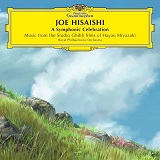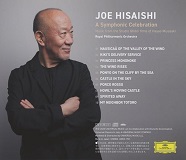 Subtitled "Music from the Studio Ghibli films of Hayao Miyazaki" this album is a collection of music from Joe Hisaishi's scores to these Japanese Anime films. The collaboration between Director and Composer has been an important aspect of their parallel careers. The album celebrates that partnership, recorded in London with the music reworked into Suites and re-orchestrated to suit the scale of the Royal Philharmonic Orchestra. Before talking about the music itself, it is worth setting out how their collaboration works. Typically composers are engaged quite late on in the filmmaking process during post-production, but in the case of Miyazaki and Hisaishi details of the story, the design and the characterisation are developed in parallel with the music, until a musical language for the film is established allowing the animation to be progressed with the music framework acting as a guide, before the final details of the music to picture is scored. While this type of method is not without precedent it is quite rare, particularly as a modus operandi extending over multiple projects.
Subtitled "Music from the Studio Ghibli films of Hayao Miyazaki" this album is a collection of music from Joe Hisaishi's scores to these Japanese Anime films. The collaboration between Director and Composer has been an important aspect of their parallel careers. The album celebrates that partnership, recorded in London with the music reworked into Suites and re-orchestrated to suit the scale of the Royal Philharmonic Orchestra. Before talking about the music itself, it is worth setting out how their collaboration works. Typically composers are engaged quite late on in the filmmaking process during post-production, but in the case of Miyazaki and Hisaishi details of the story, the design and the characterisation are developed in parallel with the music, until a musical language for the film is established allowing the animation to be progressed with the music framework acting as a guide, before the final details of the music to picture is scored. While this type of method is not without precedent it is quite rare, particularly as a modus operandi extending over multiple projects.
Studio Ghibli is often refered to as the Japanese equivalent of Disney, producing animations (or "Japanese Anime") for family audiences with child-friendly stories. The stories are full of magic, fantasy and adventure like modern fairy tales. The original movies are usually in the Japanese language, but their popularity has ensured the release of English (and other) editions with A-list voice actors. The music is child-friendly too and very much in the Disney/Hollywood tradition. As part of the re-orchestration process Hisaishi has given a further Hollywood gloss to the versions for this album, with many tracks sounding like big screen musical numbers. For example the opening track is based on the pair's first collaboration "Nausicaä of the Valley of the Wind" in 1984. It has a big dramatic opening with birdlike calls on woodwind, leading to a main theme on piano soon joined by strings. We then seem to hear a choral version of Handel's famous Sarabande, a busy orchestral workout with unusual percussive sounds, more fluttering woodwind, leading to a children's song, with tinkly percussion leading through a succession of romantically scored episodes to a big conclusion. It is a varied Suite of music from the film touching on the score's main highlights.
Highlights of the rest of the album include "Kiki's Delivery Service" with a typically cute Hisaishi melody, and "Princess Mononoke" is more Japanese in style, with some choral/orchestral darkness which wouldn't be out of place on an Indiana Jones movie, resolving to a Japanese song. "The Wind Rises" features the tremolo sound of a Mandolin, whereas "Ponyo on the Cliff by the Sea" features the endearing "fishy in the sea" song, sung in English. "Castle in the Sky" has a Handelesque fanfare in 6/8 time, and a children's choir leading to a joyous choral setting, while "Porco Rosso" is a laid back swing track for piano and jazz combo. The familiar theme in "Howl's Moving Castle" is given a wide variety of variations, from light pizzicato strings to an epic swash-buckling treatment. The piano in "Spirited Away" moves between solo and voice accompaniment. The pianist is not credited in the album notes, suggesting the piano is played by Hisaishi himself as he frequently does in concerts. And finally "My Neighbor Totoro" is more Japanese in style again with plenty of tuned percussion, leading to a spirited choral/orchestral extravaganza.
This review is based on the single CD version of the album, though I note now that there is also a 2 CD release with a couple of bonus tracks in addition to the now obligatory vinyl version. See the Deutsche Grammophon website for details of the different editions. The whole package is supported by some comprehensive programme notes by Michael Beek. The album is of course available to stream or download, and the physical versions are also available in stores such as Amazon.co.uk and Amazon.com. If you are a fan of Joe Hisaishi already or are curious about his music, this album is a good place to start.
